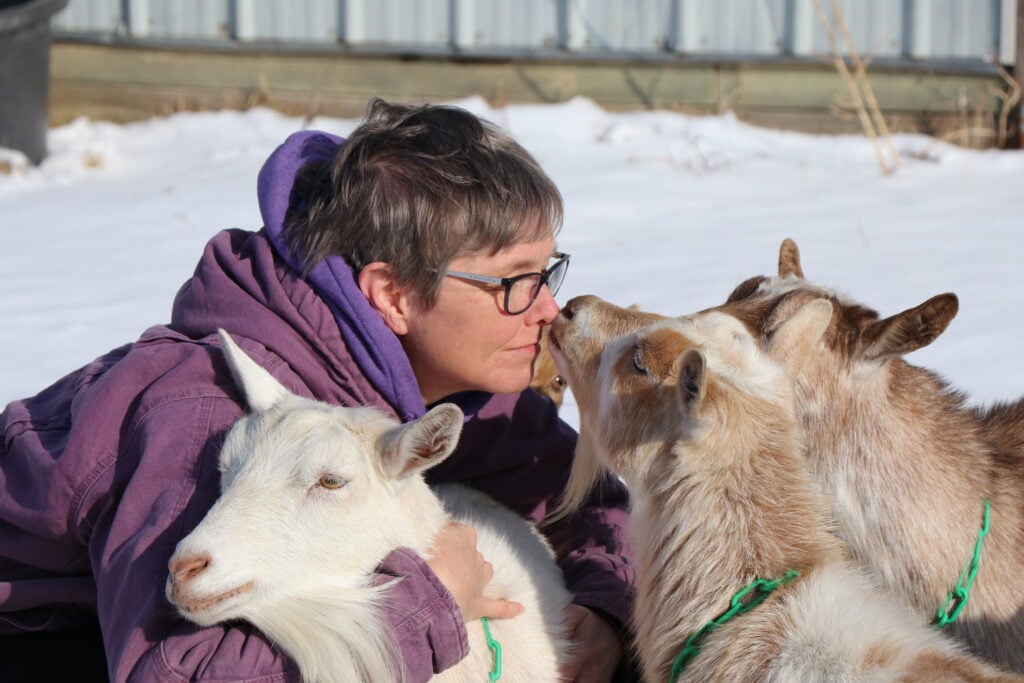
Thrifty Homesteader was created in 2012 after the publication of my second book, Ecothrifty. The name was coined by one of my followers because I said that I didn’t want anyone to think that they had to be rich to homestead or live a greener life. I had heard too many people say that they wanted to live a more sustainable life, but they couldn’t afford it.
After my third book, Raising Goats Naturally, was published in 2013, a lot of people started to look at me as the goat lady. In response to more questions about goats, I wrote more about goats. I also started teaching an online course on raising goats for the University of Massachusetts-Amherst. And so, I accidentally became a goat expert.
How can we help you?
Although there are more than 200 articles on goats here, as well as 100+ podcast episodes, you will also find articles on gardening, chickens, and other livestock. You’ll find links at the top of every page to take you to my published books, podcast show notes, online video courses, and all of those articles!
My goat story
When we moved to our farm in 2002, we bought three female goats and a buck because I wanted a little goat cheese. Then I learned to make yogurt and mozzarella and other cheese, and we needed more goats. Within a few years, we were milking a dozen does — but we owned even more. Sadly, about a third of them were not getting pregnant, were having miscarriages, or giving birth to stillborn kids, and none of the vets knew why. None of our bucks lived past the age of three for the first five years!
A lot of people expressed surprise that we had not given up, but by then, I was totally smitten with goats. I was determined to figure out why we had a problem, so I dove into the research. Eventually, I figured out that our goats were suffering from severe copper deficiency, and we also had complete resistance to all dewormers. By the time I learned what our goats needed to thrive, I had enough information to write a 300-page book! So I did!
But I don’t tell anyone to copy what we do because what works on our farm might not work on yours! Simply trying to copy someone else’s management without understanding what goats need is not a good strategy. This is why I don’t have a checklist of how to raise goats. Instead, I educate and inform readers and viewers about what goats need and how your farm may or may not be able to provide that for them naturally.
You can do it too!

It was a true fish-out-of-water experience as we tried and failed at many things. But we were determined and refused to give up. As we figured things out, people started asking me to teach them things, such as how to make soap or cheese. The requests became so numerous that I decided to start teaching classes on the farm. Then I started speaking in other places, including the very first Mother Earth News Fair in Pennsylvania in 2010. Since then, I’ve spoken at about 20 of them, as well as many other homesteading and sustainability events across the US and Canada.
I started writing books, as well as this blog. I always say, “I made all the mistakes so you don’t have to,” and I’m only half-joking about that. Luckily since I’ve started writing and speaking, plenty of people have shared their successes and failures with me, so I know that I didn’t actually make all the mistakes. It only feels like it sometimes.
I always say that if we can do this, anyone can, and I’m not joking. Our livestock experience consisted of caring for two cats and a poodle when we moved out here, but from reading books, finding mentors, trying, and making mistakes, we’ve learned to do everything we do today. If you’d like to know more about our homestead, visit our website, Antiquity Oaks.
This website is a unicorn because most tell you what the website owner does with their goats without any explanation of why. You will notice in our articles that we often cite veterinary textbooks and scientific studies that have been published in peer-reviewed veterinary journals. Goats are not native to North America, so it is important that you understand their needs, including the “why” behind the “what” and figure out how to raise them successfully on your farm. Had my neighbor four miles away supplemented her goats with copper like I did, she would have killed her goats with toxicity because they didn’t have well water with high levels of sulfur, which binds with copper, making it unavailable to the goats and resulting in copper deficiency.
Got goat worms? Then you really need to understand the science behind parasite control. You will get a dozen different answers from people in various parts of the country because different areas have different parasite problems. And you might not even be able to do what another goat owner in your area is doing because their management is different than yours, which means their problems will be different.
Our goal is to make you the expert on your goats and other livestock on your farm!
So, have a seat, grab your favorite beverage, and start reading!


